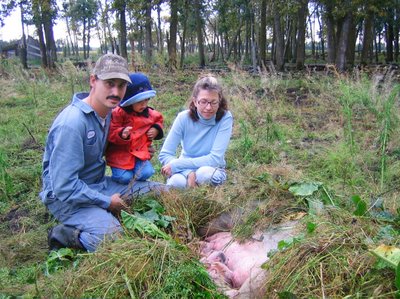by Larry Powell
A west-central Manitoba man says his family got sick from exposure to chemicals from crop dusting planes this summer.

A west-central Manitoba man says his family got sick from exposure to chemicals from crop dusting planes this summer.

Lloyd & Donna Burghart. In the foreground, a sow with several piglets. PinP photo
Tens of thousands of acres in the Swan Valley, and around Roblin to the south, were sprayed with crop pesticides from spray planes in July and August, following a serious outbreak of Bertha armyworms, which destroy canola crops.
The Swan Valley area is in the far west region of Manitoba, near the Saskatchewan border.
Now, Lloyd and Donna Burghart of nearby Bowsman said they believe Lorsban (chlorpyrifos), an insecticide that was being sprayed on a canola crop across the road from them, has made them and their four children ill.
"I started shaking and a-sweatin' and I kind of was panicking and I didn't know … how severe the symptoms would be," Lloyd Burghart recalled.
"I didn't know if I was going to actually make it to the house."
The hog and cattle farmer described one August morning when he went into his yard to do chores. A stiff breeze came up and he was almost overcome by the strong fumes.
Burghart said he, Donna and their four children packed up and left the house for the next two days.
"When we ran out of the house, I could actually feel my chest tightening — and we were just from the house to the car getting all the kids out," Donna Burghart said.
"And then, [I] just didn't feel good for the next day or so. And our children, their eyes got infected and just red and bloodshot from it."
That week, all members of the family developed problems, including nausea, vomiting, bloodshot eyes, headaches and dizziness.
Ken Cameron of Ken Kane Aerial Spraying in Minnedosa, Man., said it's possible people on the ground could have been exposed to Lorsban, but he's not sure what can be done about it.
"Certain things can affect certain people differently, and I guess if the weather conditions are such that the fumes were blowing into his yard, that can affect him, and I'm not sure how you combat that," Cameron said.
An official of U.S.-based Dow AgroSciences, which makes Lorsban, told CBC News that it needs more evidence before any link can be proven between the Burghart family's ordeal and their product.
The Burgharts also worry about their animals following the spray exposure.


